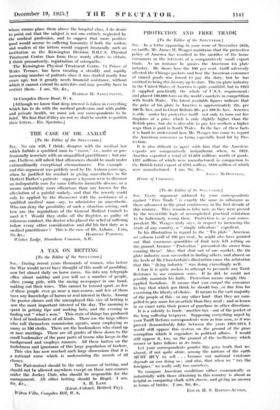[To the Editor of the SeccrAron.]
Sut,--Every argument adduced by your correspondents against " Free Trade " is exactly the same in substance as those advanced in the great controversy in the first decade of this century. They remain as false now, as they were proved by the irresistible logic of accomplished practical refutation to be ludicrously wrong then. Protection is, as your corres- pondent Mr. Weager truly says, in respect to increasing the trade of any country, a " simply ridiculous " expedient.
In his illustration in regard to the " Tin plate " American ad valorem tariff of 100 per cent., he might also have pointed out that enormous quantities of fruit were left rotting on the ground, because " Protection " prevented the owner from canning them ! Also, that shut out of one market, the tin plate industry soon succeeded in finding others, and almost on the heels of Mr. Chamberlain's illustration came the refutation that this " dying industry " was doing exceedingly well.
I fear it is quite useless to attempt to persuade any Twill Reformer to use common sense. If he did, he could nol possibly maintain his faith. Protection means simply this -- applied Socialism. It means that you compel the consumer to buy that which you think he should buy, or fine him for exercising the liberty of choice. It means to the vast majority of the people of this—or any other land--that they arc com- pelled to pay more for an article than they need ; and so lessen in an exact ratio their power of purchase in other directions.
It is a subsidy to trade—another tax --out of the pocket of the long suffering taxpayer. Supposing everything urged by your Tariff Reform correspondents were as true now, as it was proved demonstrably false between the years 1901-1914, would still oppose this system on the ground of the gross corruption which it engenders in political affairs. I would still oppoic it, too, on the ground of the inefficiency which sooner or liter follows in its train. "-
Let your correspondents ponder this grim truth that we almost, if not quite -alone, among the nations of the earth MUST BUY to sell . . beituse our national existent depends On our doing" so ; and also, that when we " tax the foreigner," we really only tax ourselves.
To compare American conditions either economically or industrially with those Obtaining in this country is about as helpful as comparing chalk with cheeSe, and giving an answer in terms of bricks.- -I am, Sir, &e.,
EDGAR II. S. BARNES-AUSTIN.














































 Previous page
Previous page